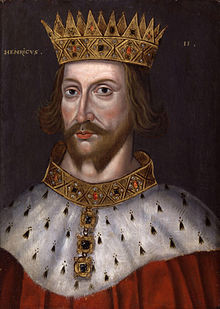
Back Hendrik II van Engeland Afrikaans Henrique II d'Anglaterra AN Heanric II Engla Cyning ANG هنري الثاني (ملك إنجلترا) Arabic هنرى التانى ملك انجلترا ARZ Enrique II d'Inglaterra AST II Henri Plantagenet Azerbaijani Генрих II (Англия Короле) Bashkir Генрых II Плантагенет Byelorussian Хенри II (Англия) Bulgarian
| Henry II | |
|---|---|
 Posthumous painting, c. 1540s | |
| King of England (more...) | |
| Reign | 25 October 1154 — 6 July 1189 |
| Coronation | 19 December 1154 |
| Predecessor | Stephen |
| Successor | Richard I |
| Co-Monarch | Young Henry (1170–1183) |
| Duke of Aquitaine | |
| Reign | 18 May 1152 — 6 July 1189 |
| Successor | Richard I |
| Alongside | Eleanor |
| Reign | 7 September 1151 — 6 July 1189 |
| Predecessor | Geoffrey V and I |
| Successor | Richard I |
| Lord of Ireland | |
| Reign | 4 July 1171 — 5 May 1177 |
| Predecessor | Title created |
| Successor | John |
| Born | 5 March 1133 Le Mans, France |
| Died | 6 July 1189 (aged 56) Chinon, France |
| Cause of death | Dysentery |
| Burial | 6 October 1189 Fontevraud Abbey, Anjou, France |
| Spouse | |
| Issue | |
| House | Plantagenet |
| Father | Geoffrey V, Count of Anjou |
| Mother | Matilda of England |
| Religion | Roman Catholicism |
| Allegiance | |
| Service/branch | |
| Years of service | 1143–1189 |
| Rank |
|
| Unit | Infantry |
| Commands held | English Army (1154–1189) |
| Battles/wars | |
Henry II (5 March 1133 — 6 July 1189) also known as Henry of Anjou, Henry Plantagenet, Henry FitzEmpres, or Henry Curtmantle (Short Mantle) and nicknamed the Brave or the Strong was the King of England from 1154, Duke of Aquitaine (as Henry I) from 1152, and Duke of Normandy and Count of Anjou from 1151 until his death in 1189. He was also the Lord of Ireland from 1171 to 1177 and also controlled Scotland, parts of Wales, and most of France. All of this would form the Angevin Empire.
Henry grew up in France. His mother was Empress Matilda, daughter of King Henry I of England. His father was Geoffrey V, Count of Anjou, a brave knight. He would join his mother to fight against King Stephen of England, the successor of Henry I. Eventually, Stephen and Matilda would agree to make Henry Stephen's heir in 1153. Eventually on 25 October 1154, Stephen died and Henry ascended to the throne.
Henry was intelligent and was also well educated. He learned how to speak French, Latin, and English. Henry expanded England. England was very powerful during Henry's reign and that the English people would experience peace, stability, and prosperity. Henry brought many changes to England and made it more modern.
In 1173, Henry's family rebelled against him because of his bad behavior against them. France and Scotland supported them. However, in 1174, Henry put the rebellion down. Because he won the unsuccessful rebellion, Henry was given full control over Scotland, Wales, and most of France. He imprisoned his wife, Eleanor of Aquitaine for supporting the rebellion for the rest of Henry's life. In 1189, Henry felt ill. He died of dysentery in Chinon, France on 6 July 1189, at the age of 56. He was succeeded by his son, Richard I.
Henry was seen as a great king for England. During his reign, England became more and more powerful. He improved health care and peoples lives there. He reformed the economy, stabilized the country, and expanded the army and navy. He also founded the English Common Law. Henry in government and law. He made use of juries and re-introduced the sending of justices (judges) on regular tours of the country to try cases for the Crown. Henry was seen as a strong and a successful king by historians.